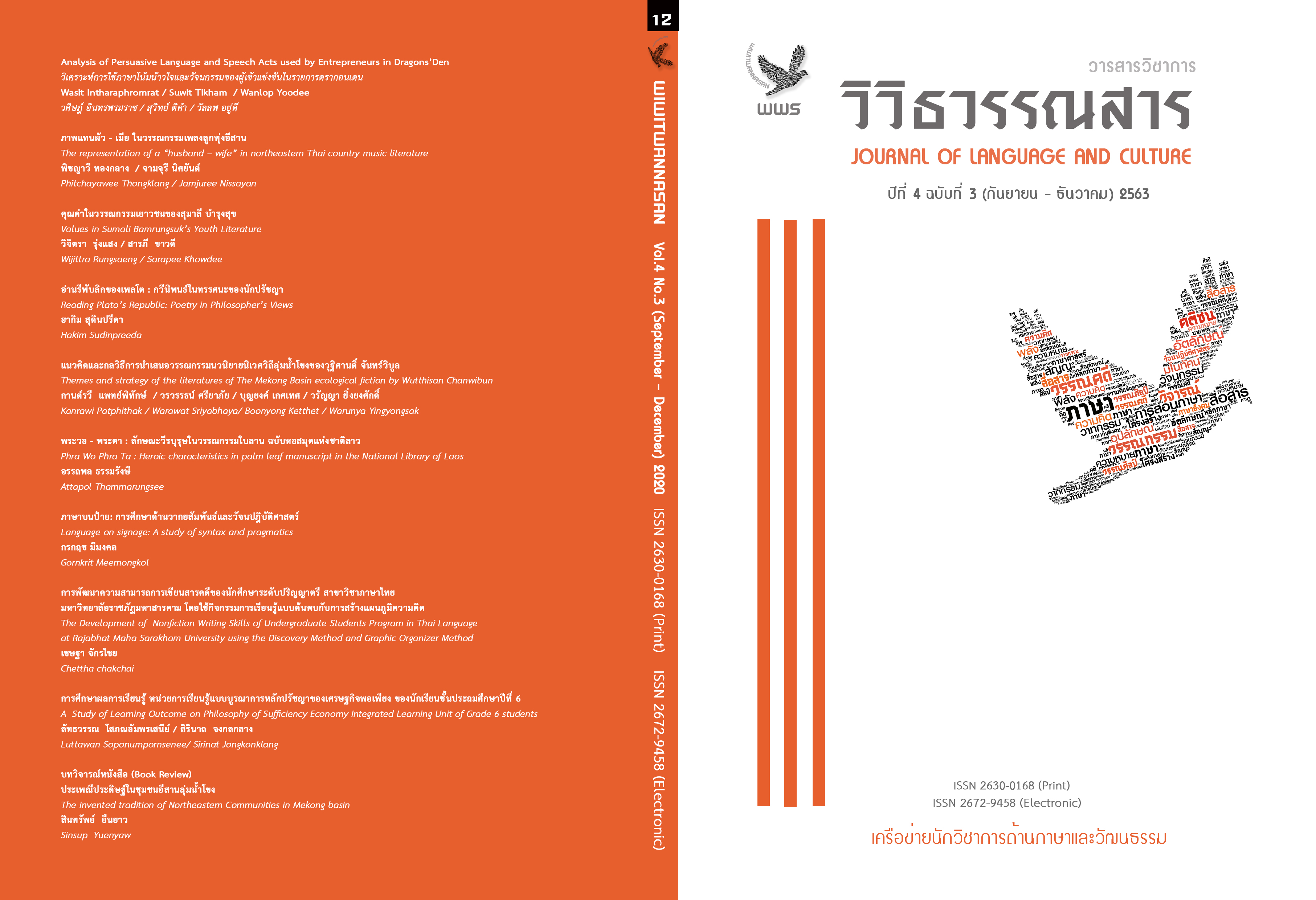Reading Plato: Poetry in Philosopher’s Views
Main Article Content
Abstract
This paper aims to analytically study Plato’s diagnostic discussion of poetry and present the results by synthetically reading the relevant dialogues appeared in The Republic, Book Two, Three, and Ten. The hermeneutic approach employed in the study is to discuss several disputed issues between poetry (including rhetoric) and philosophy. The finding is exposed with analytic description. The study finds out that Plato’s critique of the influence of poetry is imputable to his reflection on a philosopher’s attempt (through Socrates’s voice) to handle with the Athenian culture of reality-inconsiderate appreciation given to poets at that time. To him, poets are imitators/creators of reality, conveying what is believed to be true to the public using the theory of Form and the schema connecting together an idea, artefact, and the imitator. Instead of getting disapproved, this phenomenon impressed them. Therefore, the poets must be conditionally banished out of the “city in speech”. As they know not nor they recognize the essence of reality and philosophical arrangement the moment their rhetorical exchange takes place. However, between philosophy and poetry, there is no complete difference. To remain neither active nor convinced is the advice of Socrates for philosophers to handle with poets who brag their realization of the truth.
Article Details
Copyright is that of the journal any reproduction must be permitted by the editor of journal
References
Clay, D. (2000). Platonic questions: Dialogues with the silent philosopher. University Park, PA: Pennsylvania State University Press.
Griswold, C. L. (2000). E Pluribus Unum? On the Platonic ‘Corpus’. Ancient Philosophy, 20 (1), 195-197. doi:10.5840/ancientphil200020120
Griswold, C. (2020, February 12). Plato on Rhetoric and Poetry. Retrieved from https://plato.stanford.edu/entries/plato-rhetoric/
Halliwell, S. (2002). The Aesthetics of mimesis: Ancient texts and modern problems. Princeton: Princeton University Press.
Klarer, M. (2013). An introduction to literary studies. London: Routledge.
Lear, J. (1999). Open minded: Working out the logic of the soul. Cambridge, Massachusetts: Harvard University Press.
Miller, P. A., Platter, C., & Platón. (2010). Plato's Apology of Socrates: A commentary. Norman: University of Oklahoma Press.
Notomi, N. (2011). 15. Image-Making In Republic X And The Sophist: Plato’s Criticism Of The Poet And The Sophist. Plato and the Poets, 299-326. doi:10.1163/ej.9789004201293.i-434.69
Plato, Hamilton, W., & Emlyn-Jones, C. J. (2004). Gorgias. Harmondsworth, Middlesex: Penguin Books.
Plato, & Bloom, A. (1968). The Republic. New York: Basic Books. doi:https://mvlindsey.files.wordpress.com/2015/08/allen-bloom-the-republic.pdf
R., R., & Dolezel, L. (1991). Occidental Poetics: Tradition and Progress. Poetics Today, 12 (2), 369.doi:10.2307/1772864
Tucan, D. (2013). The Quarrel Between Poetry and Philosophy: Plato - A Sceptical View on ‘Poetry’. Procedia - Social and Behavioral Sciences, 71, 168-175. doi:10.1016/j.sbspro.2013.01.023
Urmson, J. O., (1997). Plato and the Poets: Plato’s Republic: Critical Essays, R. Kraut (ed.), Lanham (pp. 223–34). MD: Rowman and Littlefield
West, T. G. (1980). Plato's Apology of Socrates: An interpretation, with a new transl. Ithaca, NY: Cornell Univ. Pr. doi:https://www.sjsu.edu/ people/james.lindahl/courses/Phil70A/s3/apology.pdf


